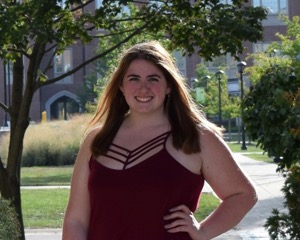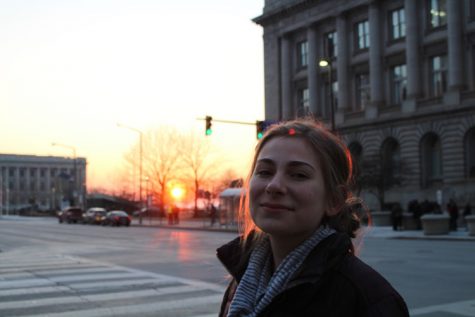Johnson responds to faculty outcry regarding academic prioritization
Apr 14, 2019
President Michael Johnson attended a supplemental faculty meeting on March 27 to clarify miscommunications regarding academic prioritization, a plan that reallocates resources by “adding to stronger programs and subtracting from weaker programs.”
A faculty meeting took place on Wednesday, March 20 that caused faculty members to fret over the reallocation of resources as well as job security. Many members of the faculty felt as though they were being excluded from the academic prioritization process.
“Some of the other concerns were about the apparent lack of any faculty involvement in this process,” said Simon Fitzpatrick, a philosophy professor. “We have a faculty handbook, and that is basically our contract. There is a provision in the faculty handbook which says that the faculty controls the curriculum. Any changes to academic programs would have to be things that are approved by the faculty, if the procedure is going to be consistent with the faculty handbook. Many of us were concerned that this process, at least as it was initially described, seemed like a clear violation of the handbook.”
Margaret Farrar, the dean of the College of Arts and Sciences, explained, “[Academic prioritization] is always a fraught process because it involves the transfer of resources. And anytime you do that it makes people nervous. You know all these stories of colleges radically reducing the number of departments, faculty and tenured faculty. So that makes people nervous, and rightly so. If your livelihood is on the line, you have a right to be concerned. It can be a very tense process. And that is why good communication from the outset is so important.”
Following the meeting on March 27, where Johnson clarified his intentions and communicated his goals, the faculty seems to have more confidence in him.
“My view of the meeting that we just had was fairly positive. It seemed like the president was receptive to our concerns and answered our questions honestly and openly,” said Fitzpatrick.
“The faculty responded very positively to the president. He offered an olive branch, a kind of reset, so it would have been truculent not to take it,” said Dan Kilbride, head of Faculty Council. “It’s in everyone’s best interests for there to be a cordial and candid relationship between the president and the faculty. Even some of the crankier faculty responded positively to the president’s outreach, which was very positive.”
“One thing I was really impressed with is the faculty had concerns and raised them, and President Johnson responded right away both in an email and by coming to the additional faculty meeting last week, where I thought he was very frank and forthcoming about what was and what was not settled about the process. And I think that was very helpful to people,” said Farrar.
“[Johnson’s] message was that all constituents on campus will have a seat at the table as we look towards the strategic planning process. And he specifically said faculty has a seat at the table as we look toward John Carroll’s future,” said Mike Scanlan, executive director of strategic communications for the University.
However, there are still lingering questions by the faculty and various concerns about the Academic Strategy Partners, the company that Johnson has contacted to facilitate the academic prioritization process.
“We do have a number of questions about why these particular consultants were chosen. To put it mildly, they don’t have a very good reputation,” said Fitzpatrick. “Certainly amongst faculty organizations they have been criticized in some instances for trampling on faculty rights or at least encouraging institutions to trample on faculty rights, so the fact that these consultants were chosen is something that many of us still have some concerns about.”
Farrar explained, “I don’t think we know [how academic prioritization will look]. It is at its early stages, and the president has made it very clear that we have no obligation beyond this initial meeting with Academic Strategy Partners, so I think it’s really to be determined at this point.”
“To some extent, it depends on what the institution —whether that is the president, the board or whoever —wants the end state to be. What do we hope to get out of prioritization? Is this process with this firm going to accomplish this for us? I think all of those are open questions right now,” she continued.
Scanlan explained the goal of ASP visiting Carroll this April. “At the meeting, [Johnson] clarified that the forthcoming visit from ASP is not related to any long-term contract that we’ve signed. It is a get-to-know you and see if it makes sense for us to work together meeting. Faculty will have the opportunity to speak with the ASP team in person, and he also promised there will be a follow up to the ASP meeting where he’d listen to faculty feedback.”
Going forward, Johnson has scheduled a community forum to explain his vision for JCU’s future. “On April 10, he is going to bring a vision to our community, and that vision is the baseline for constructive conversations for the future. That vision is larger than simply academics,” said Scanlan.
This new project is a large undertaking, but it is not something the Student Union is shrinking from. In fact, Bishop wants the reevaluation and updating to be a continuous process. “I would like to see this become precedent, meaning I would like to see a project done by Student Union every year. It doesn’t have to be the scale of renovating the student center. It can be more simplistic, or some years it can be much more grand. I mean this could even be to the scale of when the start renovating the dorm buildings we get involved.”
To manage the massive changes, Bishop wants to create a special projects committee that includes senators and students who would like to join. The committee would be charged with the drafting of special project proposals and the pursuance of them until completion. The special projects committee is there to serve all students who have an interesting idea or want to see something new on campus. “That is the goal of the special projects committee,” said Bishop.
The audience, as it was primarily composed of members of our student government, reacted strongly to Bishop’s plans. Maddie Tobolewski, executive vice president elect, was a special piece in Bishop’s blueprint for a new Student Union.
Previously, the EVP had no specified role. “I think the Executive Vice President has a really great opportunity to insert themselves wherever they’re needed,” said Tobolewski. Though the EVP has been able to serve where they wished, Bishop is integrating the position to serve as a link between the Executive Board and Senate, which will operate separately next year.
Tobolewski appeared open to this idea. In her statement, she said, “we only work if we’re working together.” By being the lane of communication between the Executive board and the Senate, she would be able to accomplish this.
Another responsibility she would have would be to “make sure that everybody knows where to find and has read the constitution of the Student Union,” said Tobolewski. This was met with snaps and applause, indicating that some members of the student government have not read nor are familiar with their own constitution.
Tobolewski is also attempting to institute a program in which students can write and,hopefully, publish books. In her platform statement, she said, “I’ve also been working to bring a book writing program to John Carroll with the purpose of empowering students and opening doors for them.”
After the debate and ensuing election, JCU’s student government formulated as expected. Lauren Phillip was elected as the Vice President of Communications, Leah VanDine was elected as the Vice President for Diversity, Equity and Inclusion, Eddie Jenkins was elected as the Vice President for Programming, Kyle Blasinsky was elected as Vice President of Student Organizations, Brianna Sweeney was elected as Judicial Affairs, Sara Girard was elected as Vice President for Business Affairs, Maddie Tobolewski was elected as Executive Vice president and Mike Bishop was elected as the president of the Student Union.
In the 2018-2019 school year, the elected board will change the way students experience John Carroll. This will be pioneered and observed by the 24 students that fully attended the debate.













